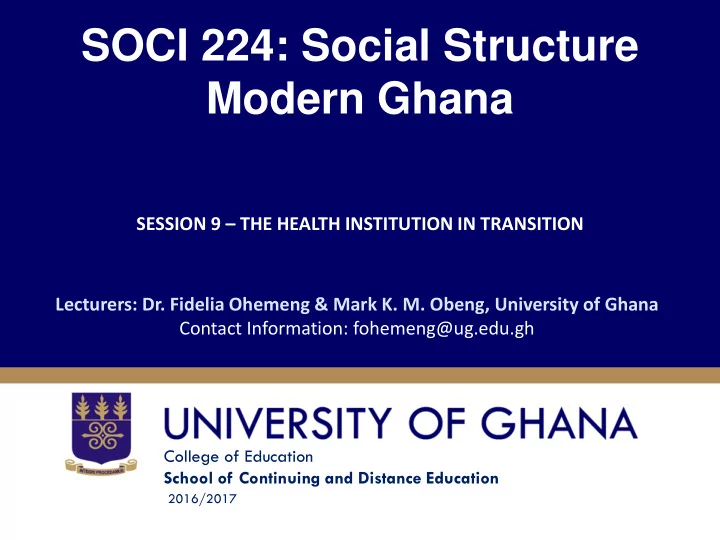

SOCI 224: Social Structure Modern Ghana SESSION 9 – THE HEALTH INSTITUTION IN TRANSITION Lecturers: Dr. Fidelia Ohemeng & Mark K. M. Obeng, University of Ghana Contact Information: fohemeng@ug.edu.gh College of Education School of Continuing and Distance Education 2016/2017
Session Overview This session gives a general overview of the health situation in Ghana. It begins by defining health, and describe how socio-cultural factors influence the experience of health. Additionally, how Ghanaians understand and interpret health is also discussed. The session will conclude by identifying the factors that influence the health seeking behaviour of Ghanaians.
Session Outline • Define health • Identify the socio-cultural influences of health • Explain the theories of health • Understand the determinants of the search for treatment • Identify the factors that influence the choice of a health facility
Reading List • Abotchie, C. (2016) Social Change in Ghana . Accra: Hans Publications. Chapter 8
Definition of Health • WHO defines health as the complete state of physical, mental, social and spiritual wellbeing. • Thus, it is not just the absence of ill health or disease. Health has: – Social meaning – Psychological – Religious meaning
Socio-culture influences on Health • Health is affected by cultural beliefs, this makes the meaning and the perception of health differ from society to society. – Examples: menarche (first menstrual period for girls) passes without incidence and cause for celebration (puberty rights) in Ghana. In the West girls going through puberty are thought to suffer from PMS (pre-menstrual syndrome. – Influences how weight gain and loss is perceived in Ghana and the Western World
OBESE OR SIGN OF GOOD LIVING?
Other Factors Affecting Health • Race/Some diseases effect people of other races more than others. • Genetic or Personal lifestyle or Institutional Inequalities – For instance fibroid, sickle cell disease affect people of African origin more than Caucasians (genetic) – African-American women are 3 times more likely to die during childbirth than white women • Class • Occupation • Gender • Income Level • Age • Cultural
Theoretical Explanations of Health in Ghana • Germ/ Natural (biological) • Social Causation (spiritual) Slide 9
Germ Caused Theory • The belief that diseases can be naturally caused by germs/virus/bacterial – This is as a result of the on-going public health education • By eating wrongly (e.g. New Yams, Unripen mangoes) • Long Exposure to Sunlight or Cold Slide 10
Social Causation Theory • Sickness as a result of a disruption in social relations – Disagreements, family feud, quarrels, disrespect of elders, etc. • As a result disease maybe caused by: – witchcraft, – magic/sorcery, – punishment from ancestors/gods, – juju (duabo) • Examples are mental illness, swollen legs/stomachs, diarrhea, or even common headache, etc. Slide 11
Explanations contd. • An initial perceived cause of a disease may change – Thus, an initial interpretation of a disease as germ caused may take on a different interpretation after a while • E.g. a headache or sore which lingers for a while – In the same way, an initial interpretation of social causation or spiritual explanation may change to germ/biological explanation • E.g. HIV/AIDS, mental illness, congenital diseases Slide 12
Search For Treatment The search for treatment is determined by the perceived cause of the disease • Germ/natural causes: herbal or orthodox medicine (hospital, clinic, pharmacy) • Social causation: psychic in nature. This involves making amends of the offending forces through rituals, sacrifices or divination, etc. • Thus, Ghana’s medical system can be described as pluralistic in nature; the fusion of modern/orthodox medicine and traditional medicine Slide 13
Factors that influence the choice of a health facility • Twumasi (1975) identified four factors: – The nature of the disease (how it is perceived) – The cost – The distance – A guarantee that a cure can be found Slide 14
Notable Milestones in Health • Korle Bu Teaching Hospital was the 1 st hospital est. in 1923 • Structure of health facilities in Ghana – Tertiary/Teaching Hospital (Korle-Bu, Komfo Anokye, Tamale, Legon*) – Regional Hospitals – District Hospitals • Primary Health Care (PHC) was adopted in 1975 Slide 15
Milestone Cont. Trends in healthcare costs: • SAP/ERP=Fee Payment* • NHIS* • Co-payment* • Special dispensation (Free Treatment ) – Maternal health – Tuberculosis – Cholera – Guinea Worm Slide 16
COMMON DISEASES (OPD) • Common diseases malaria (leading cause of death), typhoid, cholera, HIV/AIDS, etc Slide 17
Assignment • Identify one disease in Ghana: a. Examine how it is perceived (perceived cause) b. Identify the treatment options and show how the perceived cause influences the treatment Slide 18
Recommend
More recommend